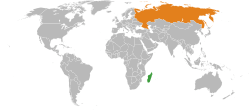Madagascar–Russia relations
Madagascar–Russia relations (Russian: Российско-мадагаскарские отношения or Мадагаскарско-российские отношения) is the bilateral foreign relations between the two countries, Madagascar and Russia. The establishment of diplomatic relations between Madagascar and the Soviet Union started on September 29, 1972. Russia has an embassy in Antananarivo. Madagascar has an embassy in Moscow.
 | |
Madagascar |
Russia |
|---|---|
History
During the 2009 Malagasy political crisis, Russia's Foreign Minister Sergey Lavrov stated that Russia is "concerned by the increased frequency of attempts on the African continent to resort to non-constitutional methods of solving internal political problems." He went on to say that, in addition to increasing economic and social problems, the use of force is of concern and runs counter to democratic principles, whilst affirming Russia's support of the African Union's position.[1]
According to the The New York Times the 2018 Madagascar elections saw Russian operatives commonly being seen walking the streets of Madagascar's capital with "backpacks full of cash" as well as "packets of gold and precious stones" which the Russians used to bribe journalists, candidates, students, and others to influence the election outcome. One key objective of the Russian interference campaign was to protect Yevgeny Prigozhin's "growing military and commercial footprint" in Africa.[2]
References
- "Transcript of Remarks and Response to Media Questions by Minister of Foreign Affairs of the Russian Federation Sergey Lavrov at Joint Press Conference Following Talks with Ojo Maduekwe, Minister of Foreign Affairs of Nigeria, Moscow, March 17, 2009" (Press release). Ministry of Foreign Affairs of Russia. 17 March 2009. Retrieved 18 March 2009.
- Cash, trolls and a cult leader: How Russia meddles abroad for profit, New York Times, 11 November 2019, retrieved 12 November 2019
External links
- Documents on the Madagascar–Russia relationship from the Russian Ministry of Foreign Affairs (in Russian)
- Embassy of Madagascar in Moscow (in Russian)
- Embassy of Russia in Antananarivo (in French and Russian)

